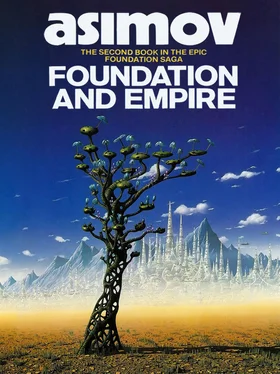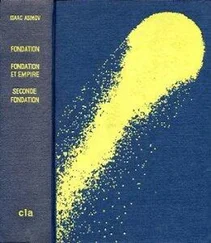Two hours later, in the ship’s kitchen, Bayta served a walloping homemade pie, and Magnifico celebrated the return to space by attacking it with a magnificent disregard of table manners.
“Good, Magnifico?”
“Um-m-m-m!”
“Magnifico?”
“Yes, my lady?”
“What was it you played back there?”
The clown writhed, “I . . . I’d rather not say. I learned it once, and the Visi-Sonor is of an effect upon the nervous system most profound. Surely, it was an evil thing, and not for your sweet innocence, my lady.”
“Oh, now, come, Magnifico. I’m not as innocent as that. Don’t flatter so. Did I see anything like what they saw?”
“I hope not. I played it for them only. If you saw, it was but the rim of it—from afar.”
“And that was enough. Do you know you knocked the prince out?”
Magnifico spoke grimly through a large, muffling piece of pie. “I killed him, my lady.”
“What?” She swallowed, painfully.
“He was dead when I stopped, or I would have continued. I cared not for Commason. His greatest threat was death or torture. But, my lady, this prince looked upon you wickedly, and—” he choked in a mixture of indignation and embarrassment.
Bayta felt strange thoughts come and repressed them sternly. “Magnifico, you’ve got a gallant soul.”
“Oh, my lady.” He bent a red nose into his pie, but somehow did not eat.
Ebling Mis stared out the port. Trantor was near—its metallic shine fearfully bright. Toran was standing there, too.
He said with dull bitterness, “We’ve come for nothing, Ebling. The Mule’s man precedes us.”
Ebling Mis rubbed his forehead with a hand that seemed shriveled out of its former plumpness. His voice was an abstracted mutter.
Toran was annoyed. “I say those people know the Foundation has fallen. I say—”
“Eh?” Mis looked up, puzzled. Then, he placed a gentle hand upon Toran’s wrist, in complete oblivion of any previous conversation, “Toran, I . . . I’ve been looking at Trantor. Do you know . . . I have the queerest feeling . . . ever since we arrived on Neotrantor. It’s an urge, a driving urge that’s pushing and pushing inside. Toran, I can do it; I know I can do it. Things are becoming clear in my mind—they have never been so clear.”
Toran stared—and shrugged. The words brought him no confidence.
He said, tentatively, “Mis?”
“Yes?”
“You didn’t see a ship come down on Neotrantor as we left?”
Consideration was brief. “No.”
“I did. Imagination, I suppose, but it could have been that Filian ship.”
“The one with Captain Han Pritcher on it?”
“The one with space knows who upon it. Magnifico’s information— It followed us here, Mis.”
Ebling Mis said nothing.
Toran said strenuously, “Is there anything wrong with you? Aren’t you well?”
Mis’s eyes were thoughtful, luminous, and strange. He did not answer.
The location of an objective upon the great world of Trantor presents a problem unique in the Galaxy. There are no continents or oceans to locate from a thousand miles’ distance. There are no rivers, lakes, and islands to catch sight of through the cloud rifts.
The metal-covered world was—had been—one colossal city, and only the old Imperial palace could be identified readily from outer space by a stranger. The Bayta circled the world at almost air-car height in repeated painful search.
From polar regions, where the icy coating of the metal spires were somber evidence of the breakdown or neglect of the weather-conditioning machinery, they worked southwards. Occasionally they could experiment with the correlations—(or presumable correlations)—between what they saw and what the inadequate map obtained at Neotrantor showed.
But it was unmistakable when it came. The gap in the metal coat of the planet was fifty miles. The unusual greenery spread over hundreds of square miles, enclosing the mighty grace of the ancient Imperial residences.
The Bayta hovered and slowly oriented itself. There were only the huge supercauseways to guide them. Long straight arrows on the map, smooth, gleaming ribbons there below them.
What the map indicated to be the University area was reached by dead reckoning, and upon the flat area of what once must have been a busy landing field, the ship lowered itself.
It was only as they submerged into the welter of metal that the smooth beauty apparent from the air dissolved into the broken, twisted near-wreckage that had been left in the wake of the Sack. Spires were truncated, smooth walls gouted and twisted, and just for an instant there was the glimpse of a shaven area of earth—perhaps several hundred acres in extent—dark and plowed.
Lee Senter waited as the ship settled downward cautiously. It was a strange ship, not from Neotrantor, and inwardly he sighed. Strange ships and confused dealings with the men of outer space could mean the end of the short days of peace, a return to the old grandiose times of death and battle. Senter was leader of the Group; the old books were in his charge and he had read of those old days. He did not want them.
Perhaps ten minutes spent themselves as the strange ship came down to nestle upon the flatness, but long memories telescoped themselves in that time. There was first the great farm of his childhood—that remained in his mind merely as busy crowds of people. Then there was the trek of the young families to new lands. He was ten, then; an only child, puzzled, and frightened.
Then the new buildings; the great metal slabs to be uprooted and torn aside; the exposed soil to be turned, and freshened, and invigorated; neighboring buildings to be torn down and leveled; others to be transformed to living quarters.
There were crops to be grown and harvested; peaceful relations with neighboring farms to be established—
There was growth and expansion, and the quiet efficiency of self-rule. There was the coming of a new generation of hard, little youngsters born to the soil. There was the great day when he was chosen leader of the Group and for the first time since his eighteenth birthday he did not shave and saw the first stubble of his Leader’s Beard appear.
And now the Galaxy might intrude and put an end to the brief idyll of isolation—
The ship landed. He watched wordlessly as the port opened. Four emerged, cautious and watchful. There were three men, varied, old, young, thin, and beaked. And a woman striding among them like an equal. His hand left the two glassy black tufts of his beard as he stepped forward.
He gave the universal gesture of peace. Both hands were before him; hard, callused palms upward.
The young man approached two steps and duplicated the gesture. “I come in peace.”
The accent was strange, but the words were understandable, and welcome. He replied, deeply, “In peace be it. You are welcome to the hospitality of the Group. Are you hungry? You shall eat. Are you thirsty? You shall drink.”
Slowly, the reply came, “We thank you for your kindness, and shall bear good report of your Group when we return to our world.”
A queer answer, but good. Behind him, the men of the Group were smiling, and from the recesses of the surrounding structures, the women emerged.
In his own quarters, he removed the locked, mirror-walled box from its hidden place, and offered each of the guests the long, plump cigars that were reserved for great occasions. Before the woman, he hesitated. She had taken a seat among the men. The strangers evidently allowed, even expected, such effrontery. Stiffly, he offered the box.
She accepted one with a smile, and drew in its aromatic smoke, with all the relish one could expect. Lee Senter repressed a scandalized emotion.
Читать дальше












